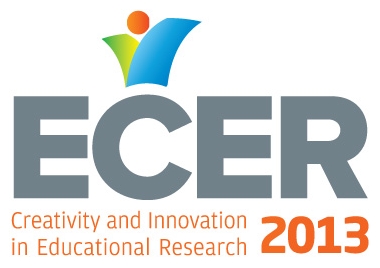EERJ Round Table: A Moot for Educational Research in Europe?
Friday, 13 September 2013, 14:00 – 15:00 hours
Room: BCONF
Over the last decades educational research has more and more become a rather differentiated, even fragmented field of study with many partial perspectives, different theoretical and methodological approaches, various epistemological and normative grounds, intersecting networks and peer groups, and different sources, languages, infrastructural conditions and opportunities for producing an publishing educational research knowledge. At present, traditionally differentiated and ramified educational research communication is under pressure throughattempts to govern educational research into the direction of politically desired and needed ‘practical’ and applicable research on education by means of research management and funding. Although educational research to a large extent still remains locked into their national and cultural borders, it more and more becomes a European, even global enterprise.
However, the more educational research crosses borders and unlocks its particular national and cultural restrictions (and certainties), the more educational research opens up its discourses and social networks into a rather unstructured, diverse open space. This space does not only provide great opportunities for the future or, in an euphemistic sense, a space of creativity and innovation. It also appears as an intransparent space of cooperation and competition, of unequal distributions of means and power, of representing and represented participants, of actors and victims of struggle and defense. In this context one could remember the notions of words which – in a Habermasian sense – denote public places and spaces of deliberate discourses and unrestricted communication. The Greek had their ‘agora’, the Romans the ‘forum’, the old British ‘moot’, and modern states ‘democracy’. Where in broad and ramified field of educational research could we identify places and spaced serving the function of a structured educational research moot?
The EERJ Roundtable wants to ask for such an open space of reflection and judgment. Its structure is not very clear; neither is it an ancient ‘agora’ or ‘forum’ nor a moot, it is not a democratic, public space and also not a research space straightly ruled according to the methodological gold standards. Could EERA and ECERs be interpreted as a ‘moot’? It is designed as a European Association of National Educational Research Associations, but there are other European Educational Research Associations. In addition, you find a high fluctuation of attendees some of them being member of a national Educational Research Association some of them, however, not. How, then, is educational research represented in Europe, and to whom does it address its conference themes and research results? How does educational research exert influence on research, policy and practical educational fields, and how is this influence justified and legitimized? Could we find or establish a discoursal European educational research space, a moot, an agora, which has enough epistemological, critical and intellectual mass to go beyond the structures of organisations and managerialism, of power and governance, of rules and regulations. Against misunderstandings: such a space is not understood as a romantic garden to escape to from the dirty work of everyday life. It is understood as a ‘garden’, which provides the opportunities of critical reflect on external structures and structuring in order to strengthen self-discipline and self-governance. It contributes to a disciplinary autonomy, which a field of study gains by its ability to translate and break external expectations or requests into a specific form, which constitutes its logic of work (Bourdieu).In times of high political and financial pressure, short timelines and low budgets it might be more important than ever, to look for or to create such a moot, in order to reflect, to de-center, to get distance to our treadmills by intensifying and dynamising an intellectual, self-governed public discourse beyond organised structures.
Against this background the Roundtable wants to address and to discuss the following questions:
- Can we identify such a European moot, and how is an European education research moot related to education and research cultures and associations, which primarily work within their national boundaries?
- To what extent do European and national educational research organisations, associations and networks contribute to European added values?
- In which sense could educational research contribute to and influence a democratic process of Europeanisation by cultivating and caring for an open and diverse educational research moot?
In view of such complex and open questions we also would like to experiment with a new format of the EERJ Roundtable. The invited speakers only should give a short input by marking the most crucial issues and suggesting basic distinctions. Most of the time we would like to make the roundtable itself a moot.
Chair:
- Edwin Keiner, Friedrich-Alexander-Universität Erlangen-Nürnberg, Germany
Speakers:
- Marit Honerod Hoveid, EERA Secretary General & NTNU Trondheim, Norway
- Stefan Hopmann, University of Vienna, Austria
- Terri Saddon, Monash University, Melbourne, Australia
